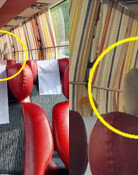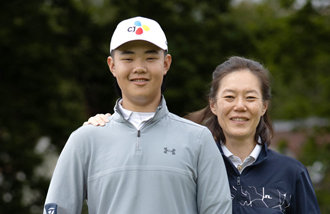More Domestic Hospitals Using Genetic Screening
More Domestic Hospitals Using Genetic Screening
Posted May. 21, 2008 07:29,

Genetic factors play a huge role in many diseases. Given the close relationship between genes and illnesses, the number of genetic clinics is mushrooming in the country.
The clinics assist in preemptive measures by identifying genetic defects and disorders.
Many venture companies specializing in biomedicine provide genetic exams under the guise of clinics. The reliability of these companies is in question, however, given possible leaks of patients genetic information or abuse for commercial gains. Certain university hospitals also operate genetic clinics as part of preventive medicine.
○ Samsung Medical Center: genetic cancer specialist
Cancer of the breast, colon, rectum, pancreas or thyroid is easily passed on to offspring than other cancers. In the case of breast and colon cancer, genetic factors play a main role in developing the diseases, making up 5-10 percent of their causes. If a relative is afflicted with these cancers, their descendants are highly prone to the same ailments.
The genetic oncology clinic at Samsung Medical Center is trying to detect inherited cancers in advance. Patients get one-on-one counseling to list their family history and determine the possibility of catching hereditary cancers. If doctors suspect a patient is likely to develop a cancer, they have him or her undergo genetic tests. Based on the likelihood of certain cancers, doctors choose what genes to test. If a cancer patient in the family is still alive, the entire family gets examinations when necessary.
When ones family history confirms that he or she is highly susceptible to cancer, the person is categorized in the high risk group and must undergo continuous checkups. When a woman is deemed susceptible to breast cancer, she is advised to take a self-examination every month and intense hospital screening at least once a year.
Even for patients with no family history of cancer, clinics ask those aged 30 and older to undergo self-breast exams once a month, those more than 35 years of age to take clinical breast exams every two years, and women older than 40 to get a mammography every year or every two years.
The clinic is staffed by some 10 oncologists and conducts about 50,000 genetic tests a year. Europeans and South Americans come all the way to this clinic to have health screenings. For more information, call (02) 3410-2710.
○ Ajou University Hospital
The Genetics Clinic of Ajou Medical Center, established in 1994, is the nations first to treat genetic diseases. In 1994, Koreans were unfamiliar with the term genetically rare incurable disease. The Ajou clinic, however, is the only one in the nation to enjoy popularity among patients with genetic disorders or chronic illnesses.
The clinic has expanded its services to include people having no symptoms despite having a family history of disease and those who want to detect genetic risks, if any.
The hospital is different in that it positions physicians with expertise in genetic counseling. These doctors scientifically analyze a clients family tree and medical history, give information on genetic and incurable diseases that the client is likely to develop, and advise on how to brace for any unfortunate development. Such intervention boosts treatment efficiency when clients develop diseases, according to clinic staff.
If a rare hereditary disease is detected via medical examinations, the clinic makes a multidisciplinary diagnosis. If a patient has neurofibromatosis, he or she is sent to the departments of dermatology, hematology and oncology given the probability of metastasis.
Regular education is also provided to patients and their families who suffer from Prader-Willi and Turner syndromes, bradyacusia, neurofibromatosis, cerebellar ataxia, tuberous sclerosis, brittle bone disease and William`s Syndrome. For more information, call the Ajou Medical Center Genetics Clinic at (031) 219-5979.
○ Asan and Severance hospitals
Asan Medical Center and Severance Hospital operate clinics for rare incurable diseases and genetic medicine, targeting teenagers. The two clinics conduct genetic tests and use the results to treat teenagers with rare hereditary disorders rather than calculating the probability of contracting a disease. Korea University Anam Hospital has also a similar clinic to conduct systematic research on medical genetics, though it is not for treatment and counseling.
corekim@donga.com







